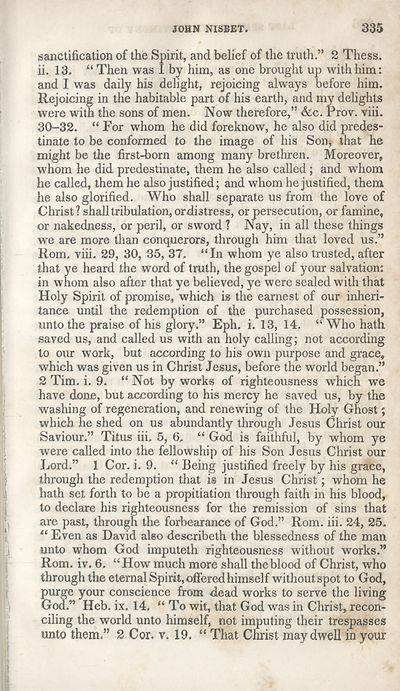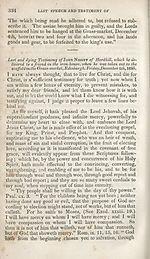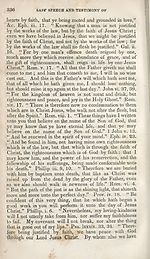Religion & morality > Cloud of witnesses, for the royal prerogatives of Jesus Christ, or, The last speeches and testimonies of those who suffered for the truth in Scotland, in the years 1681-1688, with an appendix, containing the Queensferry paper, Torwood excommunications, &c
(391)
Download files
Complete book:
Individual page:
Thumbnail gallery: Grid view | List view

JOHN NISBET.
335
sanctification of the Spirit, and belief of the truth.” 2 Thess.
ii. 13, “ Then was I by him, as one brought up with him:
and I was daily his delight, rejoicing always before him.
Rejoicing in the habitable part of his earth, and my delights
were with the sons of men. Now therefore,” &c. Frov. viii.
30-32. “ For whom he did foreknow, he also did predes¬
tinate to be conformed to the image of his Son, that he
might be the first-born among many brethren. Moreover,
whom he did predestinate, them he also called ; and whom
he called, them he also justified; and whom he justified, them
he also glorified. Who shall separate us from the love of
Christ? shall tribulation, or distress, or persecution, or famine,
or nakedness, or peril, or sword ? Nay, in all these things
we are more than conquerors, through him that loved us.”
Rom, viii. 29, 30, 35, 37, “In whom ye also trusted, after
that ye heard the word of truth, the gospel of your salvation:
in whom also after that ye believed, ye were sealed with that
Holy Spirit of promise, which is the earnest of our inheri¬
tance until the redemption of the purchased possession,
unto the praise of his glory.” Eph. i. 13, 14. “ Who hath
saved us, and called us with an holy calling; not according
to our work, but according to his own purpose and grace,
which was given us in Christ Jesus, before the world began.”
2 Tim. i. 9. “ Not by works of righteousness which we
have done, but according to his mercy he saved us, by the
washing of regeneration, and renewing of the Holy Ghost;
which he shed on us abundantly through Jesus Christ our
Saviour.” Titus iii, 5, 6, “ God is faithful, by whom ye
were called into the fellowship of his Son Jesus Christ our
Lord.” 1 Cor. i. 9. “ Being justified freely by his grace,
through the redemption that is in Jesus Christ ; whom he
hath set forth to be a propitiation through faith in his blood,
to declare his righteousness for the remission of sins that
are past, through the forbearance of God.” Rom. iii. 24, 25.
“ Even as David also describeth the blessedness of the man
unto whom God imputeth righteousness without works.”
Rom. iv. 6, “How much more shall the blood of Christ, who
through the eternal Spirit, ofiered himself without spot to God,
purge your conscience from dead works to serve the living
God.” Heb. ix. 14. “ To wit, that God was in Christ, recon¬
ciling the world unto himself, not imputing their trespasses
unto them.” 2 Cor. v. 19. “ That Christ may dwell in your
335
sanctification of the Spirit, and belief of the truth.” 2 Thess.
ii. 13, “ Then was I by him, as one brought up with him:
and I was daily his delight, rejoicing always before him.
Rejoicing in the habitable part of his earth, and my delights
were with the sons of men. Now therefore,” &c. Frov. viii.
30-32. “ For whom he did foreknow, he also did predes¬
tinate to be conformed to the image of his Son, that he
might be the first-born among many brethren. Moreover,
whom he did predestinate, them he also called ; and whom
he called, them he also justified; and whom he justified, them
he also glorified. Who shall separate us from the love of
Christ? shall tribulation, or distress, or persecution, or famine,
or nakedness, or peril, or sword ? Nay, in all these things
we are more than conquerors, through him that loved us.”
Rom, viii. 29, 30, 35, 37, “In whom ye also trusted, after
that ye heard the word of truth, the gospel of your salvation:
in whom also after that ye believed, ye were sealed with that
Holy Spirit of promise, which is the earnest of our inheri¬
tance until the redemption of the purchased possession,
unto the praise of his glory.” Eph. i. 13, 14. “ Who hath
saved us, and called us with an holy calling; not according
to our work, but according to his own purpose and grace,
which was given us in Christ Jesus, before the world began.”
2 Tim. i. 9. “ Not by works of righteousness which we
have done, but according to his mercy he saved us, by the
washing of regeneration, and renewing of the Holy Ghost;
which he shed on us abundantly through Jesus Christ our
Saviour.” Titus iii, 5, 6, “ God is faithful, by whom ye
were called into the fellowship of his Son Jesus Christ our
Lord.” 1 Cor. i. 9. “ Being justified freely by his grace,
through the redemption that is in Jesus Christ ; whom he
hath set forth to be a propitiation through faith in his blood,
to declare his righteousness for the remission of sins that
are past, through the forbearance of God.” Rom. iii. 24, 25.
“ Even as David also describeth the blessedness of the man
unto whom God imputeth righteousness without works.”
Rom. iv. 6, “How much more shall the blood of Christ, who
through the eternal Spirit, ofiered himself without spot to God,
purge your conscience from dead works to serve the living
God.” Heb. ix. 14. “ To wit, that God was in Christ, recon¬
ciling the world unto himself, not imputing their trespasses
unto them.” 2 Cor. v. 19. “ That Christ may dwell in your
Set display mode to:
![]() Universal Viewer |
Universal Viewer | ![]() Mirador |
Large image | Transcription
Mirador |
Large image | Transcription
| Permanent URL | https://digital.nls.uk/132220331 |
|---|
| Description | Thousands of printed books from the Antiquarian Books of Scotland collection which dates from 1641 to the 1980s. The collection consists of 14,800 books which were published in Scotland or have a Scottish connection, e.g. through the author, printer or owner. Subjects covered include sport, education, diseases, adventure, occupations, Jacobites, politics and religion. Among the 29 languages represented are English, Gaelic, Italian, French, Russian and Swedish. |
|---|

